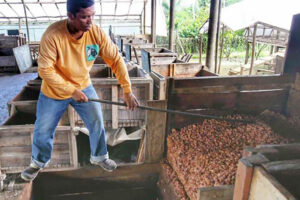A HOUSE committee has approved a bill creating a national program to raise the international competitiveness of the cacao industry.
“The proposed bill seeks to create integrated and harmonized programs, projects and activities in the promotion of Philippine cacao,” Quezon Rep. Keith Micah DL. Tan, who chaired the technical working group that reviewed the measure, told the committee.
The unnumbered substitute bill aims to implement the Philippine Cacao Industry Roadmap 2021-2025 in partnership with the private sector.
The measure also seeks to create the Philippine Cacao Industry Council under the Department of Agriculture to oversee the implementation of the roadmap.
The bill also proposes the creation of the Cacao Program Management Office, which will identify and recommend priority projects to the council.
Private sector representatives will come from Luzon, the Visayas, and Mindanao, to be selected by the council.
The proposed law also provides a donor’s tax exemption for donations, contributions, grants in cash or in kind whether local or foreign, “the cost of which shall be considered as an allowable deduction from the gross income of the donor,” Mr. Tan said.
“It also encourages chocolate shops, serving cocoa or chocolate drink including local and foreign franchises restaurants and hotels, to serve and include in their menus cacao or chocolate that is grown, produced, sourced, and manufactured locally,” he added.
At the 2023 International Cocoa Awards at the Salon du Chocolat in Paris in October, three cacao farmers from Davao City will be representing the Philippines.
Armi Lopez-Garcia, president of the Philippine Cacao Industry Association, cited the lack of post-harvest knowledge in producing more globally competitive cacao.
“It’s sad to say that during the PCQA (2022 Philippine Cacao Quality Awards) activity, out of the 43 entries, only three passed…because we realized that the farmers don’t know anything about post-harvest,” Ms. Lopez-Garcia told the committee.
Funding for the program will initially come from various agencies on the council, then in succeeding years it will receive money from the national budget.
“Unfortunately now, cacao is under the high value crops program… which means (funding) depends on the priorities (of the program),” House Agriculture and Food panel chairman and Quezon Rep. Wilfrido Mark M. Enverga said. “With this bill, we are ensuring that cacao will have its separate portfolio.” — Beatriz Marie D. Cruz

